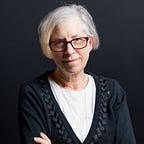9/11 and the Library of Memory
I was working in a Baltimore newsroom the morning the Twin Towers fell. Memories from that day are distilled into a series of short tableaux — sorted and stacked like a pile of photographs.
First, a buzz of rumors, coalescing into first impressions. Something was happening in New York. Big. Awful. Literally unimaginable. We reporters dashed into our editor’s office to look at television. I clapped a hand over my mouth and began shaking. The body registers truth before the rest of the brain.
I had lived in Manhattan in my twenties, in the Village and on the Upper West Side. I had rights to the place. I had walked many times across the vast plaza between the towers, the wind whipping between them. A piece of New York lived in my DNA. The breakage, the horror, felt personal.
But the collapse of the Twin Towers had nothing to do professionally with the news hole of our august little paper — a local business and law daily that had published continuously for over a century. We were on the outside looking in, like everyone else taking in the unfolding tragedy on a screen.
Until the bomb threats began rolling in. Baltimore has its own mini-World Trade Center downtown. Several people threatened to blow it up on 9/11, and for days after. I’d like to report that my colleagues and I performed editorial heroics, getting to the bottom of the threats. But all I recall are newsroom squabbles: How far would we go to report mere speculation? How dare we probe business owners to learn if they were losing revenue?
At what point would our reporting appear merely opportunistic — as if we were only interested in capitalizing on the biggest story since the assassination of JFK?
But back to the day itself, before our newsroom was scrambling for relevance. I must have left work early. I stopped by a neighbor’s house to check on her, since she worked in our World Trade Center. We were not close friends, but I fell into her arms, tears streaming.
That evening, my husband and I agreed we didn’t want to be alone. We brought our nine-year-old daughter to eat with family friends. We drank a lot of wine. We all cried openly. Our daughter, together with our friends’ son, a year older, put on a bizarre, impromptu show for us. They pretended to be newscasters, holding microphones, and reported on the horrors of the day, their young voices taking on the somber intonation of TV reporters. We adults laughed so hard, we cried again.
I don’t know what my husband remembers from that day, or my daughter, now an adult. Making memories is such a deeply personal experience. Even when we share a collective tragedy, like 9/11, we will each recall the day differently. Our moments are strictly our own.
For me, the day was overlaid by the grief I was still processing from my mother’s death, less than a month earlier. I hardly cried when she died after a long, terrible illness. But I cried a lot on 9/11, and in the days afterwards. One grief unlocking another.
Memory is reflective, its creation a product of delay. We only remember what has already passed. Virginia Woolf wrote “the past is beautiful because one never realises [sic] an emotion at the time. It expands later, and thus we don’t have complete emotions about the present, only about the past.”
Two decades after 9/11, we can acknowledge moments of beauty rising from the ashes. The firefighters who battled the flames, many overcome by toxins later on, were beautiful in their selflessness. The widows and widowers, and their children, who found ways to make sense of life again, to start over, rediscovering purpose — and, I hope, joy.
But I also will carry with me always a jumble of images — memories distilled — that combine sorrow and pain. My mother’s death, inextricably connected to the day’s emotions. The image of people falling from the tower windows — I have never let go of that. And the passengers on Flight 93, living out their last moments in hyper-aware real time, as they crashed their plane over Shanksville, PA.
Imagination and memory combine to create indelible images, imprinted forever. 9/11 lives on in millions of minds, each storing its own specific library of knowledge, emotion, experience. With each passing generation, those memory libraries will change, and inevitably fade, but they can never be fully erased.
